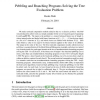222 search results - page 30 / 45 » Heuristic Evaluation Functions for General Game Playing |
ATAL
2008
Springer
13 years 9 months ago
2008
Springer
Computer agents participate in many collaborative and competitive multiagent domains in which humans make decisions. For computer agents to interact successfully with people in su...
CORR
2010
Springer
13 years 7 months ago
2010
Springer
We study restricted computation models related to the tree evaluation problem. The TEP was introduced in earlier work as a simple candidate for the (very) long term goal of separa...
DOCENG
2006
ACM
14 years 1 months ago
2006
ACM
With the advent of XML we have seen a renewed interest in methods for computing the difference between trees. Methods that include heuristic elements play an important role in pr...
SAC
2009
ACM
14 years 9 days ago
2009
ACM
Generally progressive procedural content in the context of 3D scene rendering is expressed as recursive functions where a finer level of detail gets computed on demand. Typical e...
IDA
1997
Springer
13 years 11 months ago
1997
Springer
The empirical curve bounding problem is de ned as follows. Suppose data vectors X Y are presented such that E(Y i]) = f(X i]) where f(x) is an unknown function. The problem is to a...




